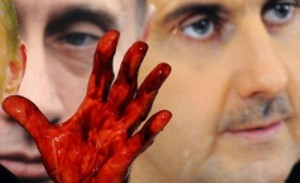 When NATO leaders meeting in Chicago this weekend take up the continued bloodshed in Syria, their best course of action is to have a long, hard talk with Russia about what it would take to turn the United Nation’s undermanned monitors into a robust, well equipped peace-keeping force.
When NATO leaders meeting in Chicago this weekend take up the continued bloodshed in Syria, their best course of action is to have a long, hard talk with Russia about what it would take to turn the United Nation’s undermanned monitors into a robust, well equipped peace-keeping force.
Russia’s leaders have been disgracefully cynical throughout the Syrian uprising. They have armed and supported President Bashar Al-Assad’s regime, and they provide diplomatic cover for his mendacious and self-fulfilling claims that unarmed opposition protesters were armed insurgents. Yet Russia’s position has also been oversimplified.
Top officials in Moscow believe they were duped last year into backing a humanitarian Security Council resolution on Libya, which the Western and Gulf Arab powers interpreted as a license for military intervention and regime change. The result, in Russian eyes, was a zero-sum economic and geopolitical loss for them. The Western air campaign also set a further precedent for intervention against authoritarian regimes that could one day be used against clients closer to home — perhaps in Central Asia or the Caucasus.
So Russia’s leaders are bitter, perhaps contributing to President Vladimir Putin’s decision to snub the G-8 summit that runs back-to-back with the NATO meeting. Russia will veto any UN resolution that could be used to justify military intervention. It will also stand — together with Iranand to a lesser extent China — on the other side of any military action that circumvents the UN, in a revival of Cold War-era proxy wars that could have unpredictable, long-term ramifications beyond Syria or even the Middle East.
This doesn’t mean, though, that the Russians are wedded to keeping Assad in power. What it does suggest is that they would have to play a leading role in any managed transition. Russia would have to be among the winners.
That isn’t a very inspiring proposition for anyone — it’s hardly in keeping with the democratic goals of Syria’s Arab Spring, when it broke out last year. Worse, to get such an attempt off the ground, U.S., Turkish, Saudi and other leaders would have to end their insistence that Assad and his clique step down, a major change of policy. They’d also have to persuade the Syrian opposition to accept Assad as an interlocutor for peace talks. Russia, meanwhile, would risk exposing the limits of its influence over Assad in persuading him to abide by a true cease-fire.
In fact, the only options less attractive than this are all the others, starting with arming the two sides in preparation for a long, Bosnia-style conflict — the only policy gathering momentum.
What about the possibility of the U.S. and its allies acting outside the UN, where Russia wields a veto? That’s what NATO did in Kosovo in 1999, after Russia and China vetoed a draft Security Council resolution that would have authorized use of force to protect ethnic Albanians in the Serb province. The 78-day air campaign worked — but only after the allies started preparations for a land invasion, causing Russia to pressure Slobodan Milosevic to capitulate.
Military options for Syria that circumvent Russia’s UN veto include arming the rebels, creating safe zones by force of (mainly Turkish) arms, or Libya and Kosovo-style coalition air strikes to support the Free Syrian Army. All of these ideas have proponents.
But before demanding any use of force, policy makers must decide whether they’d be willing to undertake a boots-on-the- ground invasion of Syria to topple the regime, followed by Iraq- style nation building. Because, as an excellent Brookings Institution analysis lays out and the Kosovoexperience suggests, each of the other military options risks failure, in which case a choice has to be made: admit defeat, or escalate. Invasion may lie at the end of that road.
The U.S. and NATO should prepare for military action, as we’ve said before. A credible threat, as in Kosovo, could help spur Russia and Assad to change their stance. In the meantime, diplomacy alone offers few promising avenues. That’s why the international community is relying on former UN Secretary General Kofi Annan’s unarmed, undermanned, undermandated and so far unsuccessful observer mission to provide a solution.
The Annan plan does have one significant plus: the backing of Russia and China. Annan should raise the stakes by making it clear to Assad, the Russians and others that the terms and scale of the mission have to change quickly if he’s to continue. Not all peacekeeping missions have to be so weak. In 1996, the UNTAES mission in a tiny sliver of Eastern Croatia quickly deployedjust fewer than 3,600 personnel, mostly combat troops, armed with 49 tanks, 180 armored personnel carriers, 12 howitzers, six assault and six transport helicopters. Russians and Ukrainians made up a third of the force at the start.
The situation in Syria is far more challenging, and Assad would only agree to a robust peacekeeping force, even one that’s Russian-led, if he felt he was on the ropes. Success would also leave a sour taste, for all involved. But it would lower the risk of Syria spiraling downward to become a failed state arena for al-Qaeda, spreading instability to Lebanon, Jordan, Iraq, Turkeyor even Israel. That contagion is the main threat to the region and to U.S. interests.
Bloomberg

Leave a Reply
You must be logged in to post a comment.